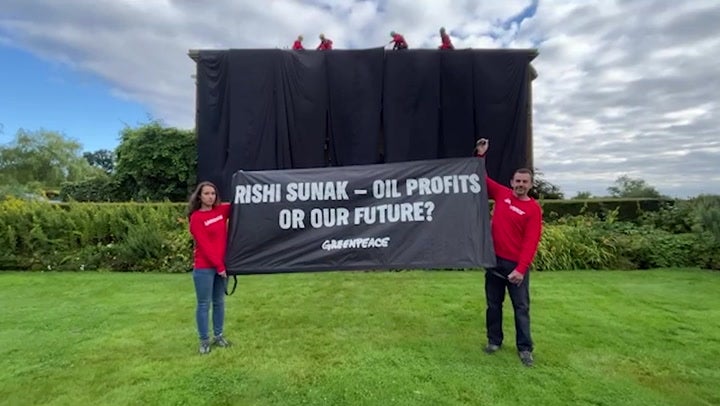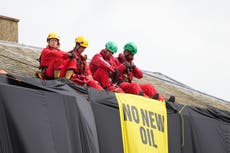Ministers blacklist Greenpeace as clamour grows for review of Rishi Sunak’s security
Exclusive: Environment department is the second to cut off contact in recent months
Your support helps us to tell the story
From reproductive rights to climate change to Big Tech, The Independent is on the ground when the story is developing. Whether it's investigating the financials of Elon Musk's pro-Trump PAC or producing our latest documentary, 'The A Word', which shines a light on the American women fighting for reproductive rights, we know how important it is to parse out the facts from the messaging.
At such a critical moment in US history, we need reporters on the ground. Your donation allows us to keep sending journalists to speak to both sides of the story.
The Independent is trusted by Americans across the entire political spectrum. And unlike many other quality news outlets, we choose not to lock Americans out of our reporting and analysis with paywalls. We believe quality journalism should be available to everyone, paid for by those who can afford it.
Your support makes all the difference.A government department has blacklisted Greenpeace as calls grew for a review of Rishi Sunak’s security arrangements after the environmental group targeted his house.
In response to the protest, environment secretary Therese Coffey told her officials to cease its dealings with Greenpeace. Any meetings will be cancelled and all engagement halted.
The Independent understands it is the second department to cut ties with the organisation in recent months, following growing concerns over its tactics.
The pushback from ministers came as the government faced increasing pressure to look again at the prime minister’s safety, after activists scaled his home in protest at new fossil fuel drilling.
Three men and two women were arrested after they reached the roof of his country mansion, draping it in oil-black fabric and a banner that said “no new oil”.
Asked about the stunt, health minister Maria Caulfield admitted it raised “concerns”. She told Sky News on Friday: “I’m not going to comment on the security arrangements of the prime minister, I don’t think that would be a responsible thing to do.
“But it does raise concerns for everyone, most people have seen some disruption from protesters.”
Grant Shapps’s Energy Security and Net Zero department had already blacklisted the environmental campaign group some months ago, The Independent understands.
Alicia Kearns, the Tory MP and chair of the foreign affairs committee, said: “There should be sufficient security that there is someone monitoring CCTV so that if someone gets onto his property police are deployed immediately.”
Former home secretary Priti Patel has urged her successor Suella Braverman to launch an immediate review into the PM’s security arrangements.
“This raises some very serious questions around how the home of a sitting prime minister has been accessed in this way, to the extent that political campaigners and activists have been able to trespass on his property and physically gain access,” she told the Daily Mail.

And former Tory leader Sir Iain Duncan Smith said he believed security “doesn’t seem to know how to protect the house of the prime minister”, adding: “There has to be an inquiry into what the hell was going on.”
Responding to the protest, a Downing Street spokesperson said: “We make no apology for taking the right approach to ensure our energy security, using the resources we have here at home so we are never reliant on aggressors like [Vladimir] Putin for our energy.”
Greenpeace defended its actions and said it had planned its protest “carefully and meticulously” and would not have done it if Mr Sunak was at home.
Areeba Hamid, co-executive director of the organisation, said the protest was a “proportionate response to a disastrous decision” by the prime minister to grant more than 100 new licences for oil and gas extraction in the North Sea.
“It was an empty home, the fact that he wasn’t there was actually national news, everybody knows that he wasn't there,” she said.
“We made sure, in fact, we wouldn’t have done it if he was there because our intention was to draw attention to the fact that what he’s doing on climate is actually a big disaster, rather than to talk about his family or where he lives, so that was the entire point.
“Security is a big part of whatever we do, we planned it carefully and meticulously, we knew he wasn’t going to be there.
“We knocked on the door to make sure that there was nobody there, initially there was no response, then we got a response, we told them who we were. So this was quite a peaceful, calm thing to make a very important point.”
She said the group has received “both kinds of opinions” online following the protest at Mr Sunak’s home.
“Protests are disruptive by nature, for the amount of comments that we have received online saying we don’t agree with you, an equal amount of people are saying ‘this was brilliant, you made your point, it was peaceful, it didn’t disrupt normal people’s everyday lives, you took it to the home of the decision maker’,” the co-director added.
The government considers its protective security system to be rigorous and proportionate. Officials maintain they have a long-standing policy of not providing information about security arrangements.
Subscribe to Independent Premium to bookmark this article
Want to bookmark your favourite articles and stories to read or reference later? Start your Independent Premium subscription today.




Join our commenting forum
Join thought-provoking conversations, follow other Independent readers and see their replies
Comments